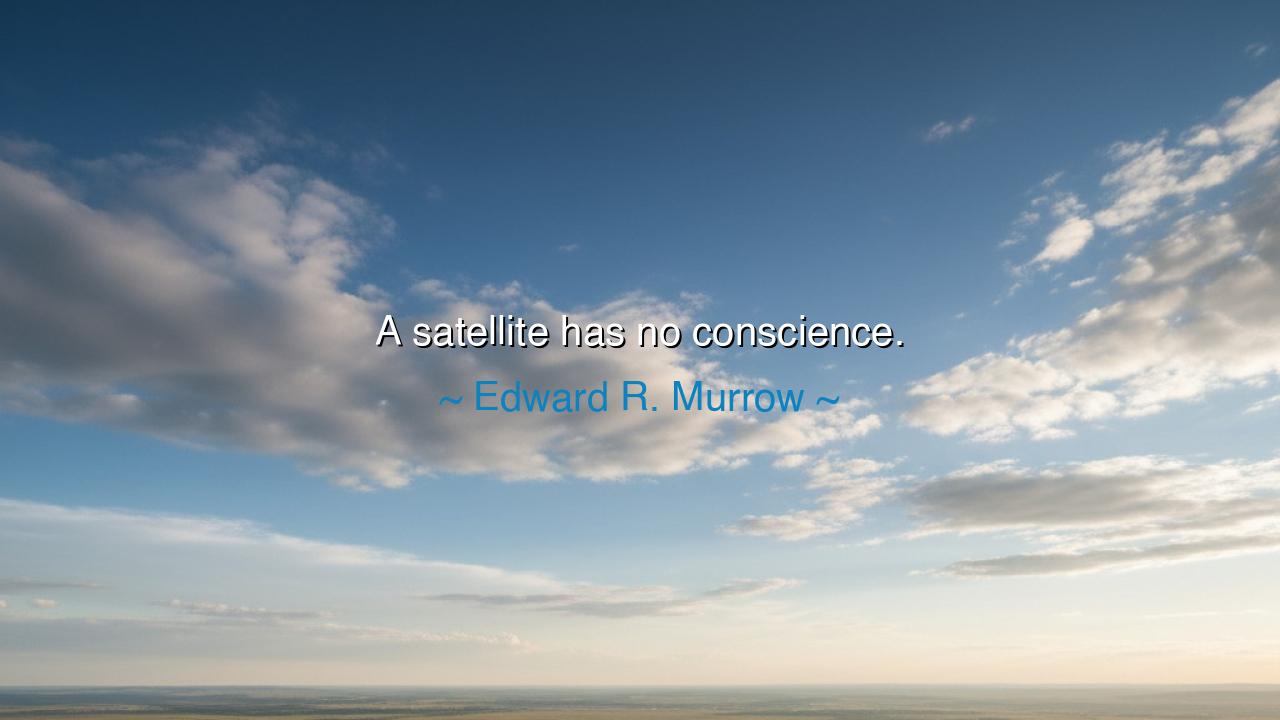
A satellite has no conscience.






Hear, O seeker of truth, the solemn warning of Edward R. Murrow, a voice of clarity in the storm of the twentieth century. He declared with weight and sorrow: “A satellite has no conscience.” At first, these words may seem simple, as if they were a mere observation of the heavens. But in them lies a truth both eternal and perilous: that the tools which man casts into the sky, or fashions upon the earth, bear no soul, no heart, no measure of right and wrong. They obey, but they do not judge. They serve, but they do not question.
In the age of Murrow, the world trembled beneath the shadow of the Cold War. Nations hurled satellites into orbit, not for wonder alone, but for surveillance, for war, for the endless contest of power. These metal eyes gazing from the heavens could witness all things, yet they could feel nothing. They could record the march of armies, the rising of missiles, the movement of ships upon the sea—yet not one spark of conscience stirred within their steel hearts. The danger Murrow saw was not the satellite itself, but the human temptation to wield such tools without wisdom, to mistake power for morality.
Consider the tale of the U-2 spy plane incident in 1960. Though not a satellite, it bore the same spirit: a machine, blind to ethics, soaring above, gathering secrets. When it was struck down over the Soviet Union, the world trembled upon the edge of war. Imagine then the greater peril of satellites, whose gaze knows no border, whose reach knows no limit. Their sight is vast, but their sight is empty, for they are without conscience. And if man does not place his own conscience above them, he becomes the true danger, using their vision not for peace, but for domination.
Yet we must not despise the satellite. For in its silence, it has also served nobler ends. It has carried the voices of nations across oceans, delivered images of storms that saved lives, and shown us the blue jewel of earth floating in the void, awakening humanity to its shared home. The satellite is neither good nor evil—it is a mirror that reflects the soul of its master. If the master’s heart is cruel, it becomes the tool of oppression; if the master’s heart is wise, it becomes the herald of knowledge.
So Murrow’s words strike like a bell: the danger lies not in the steel sphere above, but in the flesh and spirit below. It is man, not machine, who must carry conscience. To place faith in the tool without tending the soul is folly. For every satellite, every invention, every machine is but clay in the hands of its maker. The clay does not choose the form—it is the potter who decides whether it shall be a vessel of life or of poison.
Therefore, my child, the teaching is clear. In this age of rising machines, of eyes in the sky and minds in circuits, you must guard the place of conscience within yourself. Do not leave judgment to your tools, nor mercy to your devices. Let technology serve, but never let it rule. Be ever vigilant that the power in your hand does not blind the wisdom in your heart. For the stars may be filled with satellites, but only mankind can fill the heavens with justice and compassion.
What then shall you do? When you use the tools of your age, ask yourself: “Does this serve life, or does it diminish it? Does this build trust, or destroy it? Does this honor the human spirit, or chain it?” In every action, bring your conscience where the machine has none. Teach your children the same, that they may inherit a world where power is yoked to wisdom, and invention bows before compassion.
Let Murrow’s words endure as a torch in the darkness: “A satellite has no conscience.” Do not fear the machine for what it is, but fear man without conscience for what he may become. For when tools rise higher than hearts, ruin follows. But when hearts rise higher than tools, then even the coldest satellite may serve the light of humanity.






AAdministratorAdministrator
Welcome, honored guests. Please leave a comment, we will respond soon